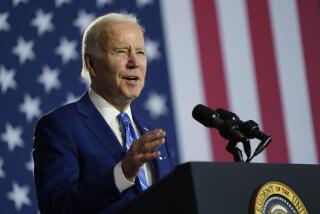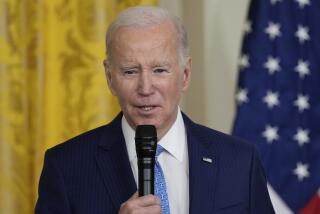White House Vows to Give Congress Health Plan Soon : Legislation: Administration hopes to quiet concerns that it is divided or undecided on parts of the package.
The White House sought Tuesday to blunt mounting criticism by promising that the long-delayed blueprint for the Administration’s health care plan will be delivered to Congress soon in final legislative form.
By pledging to wrap up its work quickly, the Clinton Administration hopes to quell concerns that its health care planners continue to have difficulty turning their ideas into a sound, workable proposal and that the White House is still divided or undecided about many aspects of the complex package.
Although providing assurances that the proposal is nearly ready, White House aides nonetheless offered different estimates for just when it would be delivered.
White House health adviser Ira Magaziner told a Washington audience Tuesday morning that the plan is likely to be delivered next week. But Dee Dee Myers, the White House press secretary, later explained that “it could come as early as next week. We don’t have a hard deadline on it.”
The delays have grown into a significant issue only two weeks after the plan’s widely praised debut, renewing questions about the workability of the never-tried proposal and giving increasingly aggressive Republican and Democratic foes a target for their attacks.
“They’ve said they only had a few wrinkles to work out but they’ve been at it for nine months,” said Rep. Jim McDermott (D-Wash.), the chief House proponent of the alternative “single payer” health reform plan. “This suggests it isn’t minor; they’re trying to figure out how to keep the wheels on the Edsel.”
Haley Barbour, Republican National Committee chairman, said the public “is coming to realize that the Clinton Administration wants to talk about anything but the specifics of their plan.”
Last week, Deputy Treasury Secretary Roger Altman predicted that the 1,500-page bill might not be completed for five weeks.
The delays have come as the White House has made and changed decisions, then checked the financial implications of their choices with elaborate computer analyses. “Whenever you change one equation, others change,” a White House official said. “What has made this all the more difficult is the lack of true statistics and hard data.”
Analysts from the Treasury Department and Office of Management and Budget have sought more time to complete the projections, even as others, including First Lady Hillary Rodham Clinton, favor putting specific time limits on the work.
Still to be made are decisions limiting the share of payroll that large employers must pay toward the health insurance premiums of their work forces, the precise amount of a federal tax increase on cigarettes and whether any other “sins” would be taxed.
A senior Administration official said that OMB and Treasury have nearly completed their revisions of cost estimates and financing mechanisms and that the figures will show that the plan will generate significant deficit reductions, perhaps close to the original target of $91 billion between 1994 and 2000.
White House aides denied suggestions of friction or disarray.
“We’re not hung up,” health care spokesman Kevin Anderson said. “We’re not locked in an internecine battle. We’re not stalling. The OMB and Treasury are scrubbing the numbers, which affect a seventh of the economy. . . . “
But officials also acknowledged that the legislation needs to be moved swiftly to an increasingly impatient Congress. Clinton originally said he planned to offer the proposal within 100 days of his Jan. 20 inauguration, but that timetable has been extended many times. Most recently, Mrs. Clinton, who headed the Administration’s health care reform effort, said she expected the plan to be ready by Oct. 15, which is Friday.
Also Tuesday, Administration sources said the federal government’s day-to-day role is likely to be somewhat reduced in the final version of the plan.
As envisioned in a Sept. 7 draft, states would have considerable flexibility to make their own reforms under the national framework, but the federal government would retain a strong oversight role. Under the emerging legislation, however, daily regulatory oversight would be replaced to some extent by highly specific rules detailing the requirements each state must follow.
Sources also said the Administration is likely to agree during congressional negotiations to a longer phase-in period for universal health coverage.
The Administration’s current timetable calls for all 37 million uninsured Americans to be covered by Jan. 1, 1998. Sources said that could be delayed until the year 2000 or beyond as a way to hold down new spending.
Cost projections for the program also continue to change.
Earlier this month, Administration analysts added $1.5 billion to the original $4.5-billion estimate of the amount the federal government would pay to assume 80% of the health care costs of early retirees.
Similarly, the projected monthly premium for Medicare coverage of prescription drugs has been revised upward, from $8 to $12 a month.
On Capitol Hill, Rep. John D. Dingell (D-Mich.), chairman of the House Energy and Commerce Committee, declared Tuesday that Congress may not be prepared to deliberate over health care reform.
In a letter to House Speaker Thomas S. Foley (D-Wash.), Dingell expressed deep concern that “no coherent procedural strategy has been discussed or devised” in the House for dealing with Clinton’s health care legislative proposals.
“In the absence of such a strategy, the process for consideration of the bill will become so chaotic as to destroy any opportunity to develop, consider, or pass a serious bill next year,” Dingell wrote. He sent copies of his letter to the chairmen of the other two key House committees that will have major jurisdiction over health care reform: Reps. Dan Rostenkowski (D-Ill.) of Ways and Means and William D. Ford (D-Miss.) of Education and Labor.
Also Tuesday, several independent actuaries who have reviewed portions of Clinton’s proposals made clear in interviews that their access to Clinton’s plan was much more limited than the President implied when he hailed their findings during his nationally televised speech on Sept. 22.
Those actuaries recently declared that Administration analysts had used “sound and reasonable” methodologies and assumptions to calculate the national average premiums of the government-designed standard benefits package.
“There was only so much a committee of seven could do,” panelist Howard Atkinson, a Silver Spring, Md., actuary, said Tuesday. “We were not asked, for example, to look at the (projected) savings in Medicare and Medicaid.”
Times staff writer Marlene Cimons contributed to this story.
* MORE BUDGET CUTS: Clinton is planning $15 billion in additional spending cuts. A18
More to Read
Get the L.A. Times Politics newsletter
Deeply reported insights into legislation, politics and policy from Sacramento, Washington and beyond. In your inbox three times per week.
You may occasionally receive promotional content from the Los Angeles Times.











